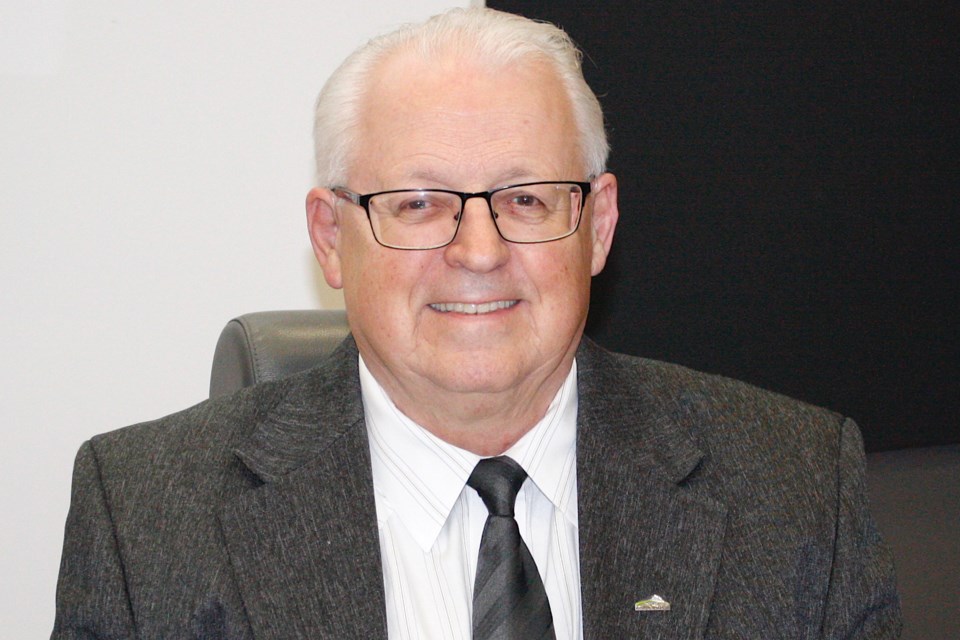SUNDRE – While the municipality’s mayor welcomes government pledges to pay off provincial debt, he harbours concerns that failing to adequately invest today in exchange for elusive decades-out promises could cause more harm than good in the short-term and in the long-term come at a higher cost.
“I’m always happy when I hear any government say they’re paying down the debt; as long as it doesn’t become at such a cost that we all suffer,” said Richard Warnock.
Sundre’s mayor offered his thoughts about the provincial government’s budget on March 1 during a phone interview with the Albertan, and said he wasn’t surprised by anything he saw.
“They’re doing the ‘hold-the-line’ thing,” he said.
From the municipality’s perspective, “it was about what we expected,” said Warnock, adding the “big ask” of $1.75 billion for the Local Government Fiscal Framework (LGFF) capital program sought by Alberta Municipalities fell far short at $722 million.
“But I do believe that ask needs to stay there and we all have to work to get those funds up. Because the aging infrastructure is huge; Sundre certainly noticed that when we started doing our underground,” he said referring to capital project priorities such as the overhaul of the Highway 27-Main Avenue high-load corridor’s underground services.
Once the municipality’s administration has had an opportunity to go through the budget in detail, the mayor said council would further discuss its implications.
For now, he said the town had not anticipated any increases to LGFF funding, and having responded accordingly was not caught off guard.
“Our municipality is getting what we got the last three years,” he said, adding advocacy efforts to increase LGFF funding will be an ongoing endeavour.
“But the government has not stopped listening. So, that’s an open door for us to go to work and convince them that that number needs to be larger.”
Meanwhile, the government is paying historic amounts into public services such as health care and education, which are enduring the strain of ever-increasing demand as the number of Albertans also reaches record heights. However, amounts allocated by the province won’t keep pace with projected inflation and a growing population.
“I’d liked to have seen more in the medical spending side for frontline workers,” he said. “We need all the help we can get in health care.”
And although Warnock would have preferred to see more funding put toward supporting municipalities, he applauded commitments to campuses like Olds College.
The $63-million boost to expand the school’s trades building benefits not only that community but the whole region, he said.
“That was a win,” he said, also citing funding earmarked for rural medical training in Lethbridge.
“Any money put towards rural medical training is a good thing,” he said, bringing up a grassroots effort led largely by the Sundre Hospital Futures Committee to promote the town as place to train in rural medicine with support from a committee of council.
Any investments into the trades are also crucial, he asserted, agreeing that funding education yields long-term returns for the provincial economy.
“All of us should lobby for increased funding for education, especially in the trades,” he said, adding trades could otherwise be at risk of becoming scarcely available in small municipalities.
As for the premier’s broken Day 1 campaign pledge to reduce taxes to eight per cent for Albertans earning under $60,000, he said Alberta already has the lowest provincial tax rate in Canada and that it will be even lower should the reduced rate ever be implemented a few years later than originally promised.
However, he also acknowledged when pressed that such relief won’t come fast enough for Albertans who are struggling today.
“There’s a lot of Alberta that needs the money now,” he said. “If there was something that was negative (in the budget), it’s spreading (relief) out too far in the future.”
Warnock also offered thoughts on the government’s proposal to mix party politics into municipal government.
“I think that party politics does not belong in municipal government,” he said, asserting that municipal leaders have a unique opportunity to represent ratepayers directly without the external influence of party politics.
“We are the frontline for our municipalities in Alberta, and I think that party politics should not play.”



